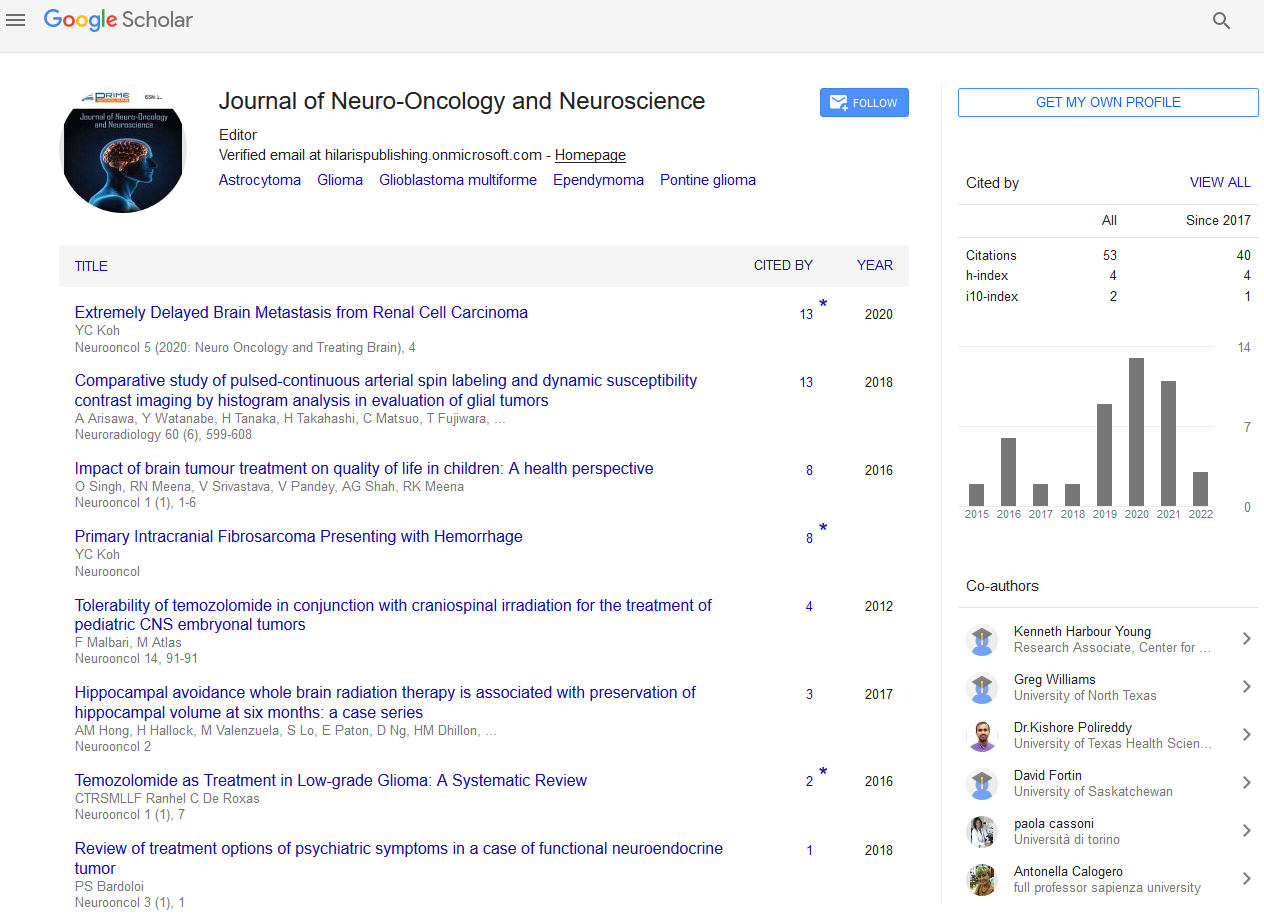Opinion - (2024) Volume 9, Issue 3
Innovations in Neuro-Oncological Surgery: Advances and Techniques for enhanced patient care
Wan Ping*
Department of Neuro Oncology, University of Florence, Italy
*Correspondence:
Wan Ping,
Department of Neuro Oncology, University of Florence,
Italy,
Email:
Received: 02-Sep-2024, Manuscript No. IPJNO-24-21305;
Editor assigned: 04-Sep-2024, Pre QC No. IPJNO-24-21305 (PQ);
Reviewed: 18-Sep-2024, QC No. IPJNO-24-21305;
Revised: 23-Sep-2024, Manuscript No. IPJNO-24-21305 (R);
Published:
30-Sep-2024, DOI: 10.21767/2572-0376.9.3.28
Introduction
Neuro-oncological surgery is a critical field within neurosurgery
focused on the treatment of brain tumors and other Central
Nervous System (CNS) neoplasms. This specialty has seen
significant advancements in recent years, driven by innovations
in surgical techniques, imaging technology, and a deeper
understanding of tumor biology. These developments have
improved patient outcomes, offering hope to those diagnosed
with complex and often life-threatening conditions. Early
surgical interventions were hampered by the inability to
accurately distinguish between healthy and tumor tissue,
leading to significant risks of neurological deficits. However,
the advent of modern imaging techniques and intraoperative
technologies has revolutionized the field, allowing for more
precise and safer surgical interventions. One of the most
significant advancements in neuro-oncological surgery is the
integration of advanced imaging modalities. Preoperative
imaging, such as Magnetic Resonance Imaging (MRI) and
Computed Tomography (CT), provides detailed maps of the
brain, allowing surgeons to plan their approach meticulously.
Functional MRI (fMRI) and Diffusion Tensor Imaging (DTI) offer
additional insights by highlighting critical brain regions involved
in language, motor functions, and other essential tasks, helping
surgeons avoid these areas during tumor resection.
Description
Intraoperative imaging has also transformed surgical practice.
Intraoperative MRI (iMRI) and ultrasound enable real-time
visualization of the surgical field, allowing for adjustments
during the procedure. This technology has been instrumental
in maximizing tumor resection while preserving normal
brain tissue, leading to improved survival rates and quality
of life for patients. Neuronavigation systems, often referred
to as the “GPS for the brain,” have become indispensable
tools in neuro-oncological surgery. These systems combine
preoperative imaging data with real-time tracking of surgical
instruments, guiding the surgeon with unparalleled precision.
Neuronavigation helps in accurately targeting deep-seated
or difficult-to-access tumors, reducing the need for invasive
craniotomies and minimizing collateral damage to healthy
brain tissue. Awake craniotomy is a technique that has gained
prominence in the resection of tumors located in eloquent brain
areas, such as those controlling speech or motor functions.
During this procedure, the patient is awake and responsive,
allowing the surgical team to monitor and assess neurological
functions in real-time. This approach ensures that critical areas
of the brain are not compromised during tumor removal,
leading to better functional outcomes. Fluorescence-guided
Surgery (FGS) is an innovative technique that enhances the
surgeon’s ability to differentiate between tumor and normal
tissue.
Conclusion
The future of neuro-oncological surgery lies in the continued
integration of technology and personalized medicine. The
development of intraoperative Artificial Intelligence (AI) and
machine learning algorithms holds the promise of further
improving surgical precision and outcomes. Additionally,
advancements in molecular and genetic profiling of tumors
will enable more targeted surgical approaches, tailored to
the unique characteristics of each patient’s tumor. Neurooncological
surgery has made remarkable progress in recent
years, with advances in imaging, navigation, and surgical
techniques significantly enhancing the safety and efficacy
of brain tumor resections. These innovations have not only
improved survival rates but also the quality of life for patients.
As technology continues to evolve, the future of neurooncological
surgery promises even greater strides in the fight
against brain tumors, offering hope to patients and their
families.
Citation: Ping W (2024) Innovations in Neuro-oncological Surgery: Advances and Techniques for Enhanced Patient Care. Neurooncol. 9:28.
Copyright: © 2024 Ping W. This is an open-access article distributed under the terms of the Creative Commons Attribution License, which permits unrestricted use, distribution, and reproduction in any medium, provided the original author and source are credited.

